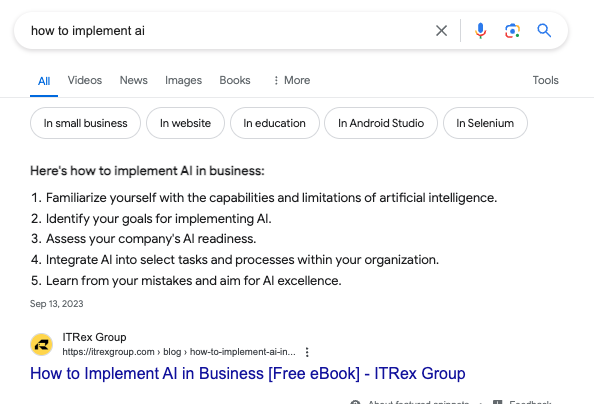Artificial intelligence is no longer a distant technology known only in science fiction movies. We have been using AI-based tools daily for years, including search engines. Are you curious about what distinguishes a search engine based on artificial intelligence? In this article, we will list its most important features and present its key functionalities.
What is a search engine based on artificial intelligence?
Artificial intelligence-based search engines are advanced information retrieval tools that process, analyze, and interpret user queries. Their main differentiator from traditional search engines is their understanding of the context of queries, which allows for more precise and relevant results. It means that the search engine not only looks at individual keywords but also understands the intent behind the query.
The most popular examples of AI-based search engines include Google and Bing, which crawl websites and record their content. The second group comprises search engines that index only the content of specific databases. Such tools include Amazon, which browses the products of online stores; YouTube, which analyzes only the collection of available videos; and Algolia, which indexes databases provided by customers. Also worth mentioning are specialized search engines that are tailored to the needs of a particular industry, such as Qtravel Search, designed to find the best travel deals.
How do search engines based on artificial intelligence work?
Search engines’ workings can vary depending on their functionality, but they usually involve several key steps. Below is a step-by-step description of how such tools work.
- Content indexing: First, the search engine reviews, analyzes, and stores the content in its database based on which it is supposed to return results. So, in the case of Google or Bing, these will be web pages, while more specific search engines such as YouTube will be a collection of videos. It lets it quickly find relevant information when a user asks a question.
- Query analysis: When a user enters a query, the search engine analyzes its meaning and context. Using Natural Language Processing (NLP) technology, it can understand the user’s intent, even if the query contains spelling errors or typos.
- Relevance evaluation: The search engine then sifts through its indexed data, evaluating the relevance of each item against the user’s query. Relevance is assessed based on various factors, such as its relevance to the query or previous user interactions.
- Presentation of results: The search engine presents the most to least relevant results. The most pertinent results are placed at the top of the list, making it easier for users to find the information they need quickly.
- Continuous refinement and improvement of results: AI search engines use machine learning models that learn from data from previous searches and user interactions. It allows them to improve continuously, delivering increasingly precise and relevant results with each subsequent query.
Advantages of Search Engines Based on Artificial Intelligence
Using search engines based on artificial intelligence is a win-win for both businesses that implement them on their sites and users. Here are some key advantages of this type of solution:
Business Benefits
- Increasing User Satisfaction: Providing fast, relevant, and personalized results improves user satisfaction. According to a McKinsey report, up to 71% of consumers expect companies to deliver customized interactions. Moreover, 76% admit to being frustrated when this doesn’t happen. Higher levels of satisfaction translate into better feedback, customer loyalty, and greater trust in the brand.
- Competitive Advantage: Implementing advanced AI technologies in search engines is still not widespread in many industries, making it an area where businesses can distinguish themselves from the competition. Accenture reports that up to 91% of consumers are more likely to buy from brands that offer relevant recommendations and offers.
- Scalable Search Solutions: AI search engines provide scalable solutions that can grow with a company’s needs. Regardless of the amount of data or number of queries, the search engine maintains high performance, which is crucial for large organizations.
- Saving Time and Money: Features such as automatic spelling error correction, prediction of user queries, and real-time data analysis enable employees to save considerable time and focus on more strategic tasks. Furthermore, by using an off-the-shelf solution like Qtravel Search, businesses can also save on the time and costs associated with developing an in-house search tool.
- Increasing Conversions: With more relevant and personalized results, companies can more effectively direct customers to the right products and services, leading to higher conversion rates. It is supported by Forrester research, which indicates that 77% of consumers would choose, recommend, or pay more for a brand that provides a personalized service or experience.
Benefits for End Users
- Greater Relevance: With advanced AI algorithms, search engines can better understand user intent, leading to more relevant results. Customers can find what they are looking for more quickly without having to sift through multiple pages of results.
- Faster Results: AI search engines are optimized for speed, ensuring that customers don’t have to wait long for their results. Efficient query processing provides instant access to the information they need.
- Time Savings: With faster access to pertinent information, customers save time that would otherwise be spent searching through less precise results.
- Better Tailored Offers: By analyzing user behavior and search history, AI search engines can deliver personalized results that match customers’ needs and preferences. This personalization makes users feel more understood and satisfied.
Key Functionalities of AI Search Engines
Search engines based on artificial intelligence offer several advanced functionalities that significantly improve the quality and precision of the results provided. Below are some of the most popular features of such search engines:
- Voice Search: This feature enables searches using voice commands. Thanks to speech recognition technologies like Google Assistant or Siri, users can ask questions and receive answers without typing or reading text.
- Image-based Search: This solution allows searches based on uploaded images. A prime example is Google Lens, where users take a photo or upload an image to search for information related to it.
- Understanding the Context of Statements: These search engines utilize natural language search, enabling them to analyze the context, intent, and meaning of queries. It allows them to understand natural language queries better and provide more accurate answers.
- Personalization of Results: AI search engines can customize results by considering users’ previous searches, preferences, and browsing history. For instance, Google offers personalized results based on user data.
- Hints and Autocomplete: This feature helps users find information faster by suggesting the most common and relevant queries in real-time. Autocomplete leverages analysis of popular queries and predictive algorithms.
- Direct Answers and Featured Snippets: Thanks to AI, search engines can provide answers directly on the search results page in featured snippets. This feature allows users to quickly access critical information without clicking on links.

Example of featured snipped displayed in Google search engine - Interactive Answers: Similar to the feature above, AI search engines can provide interactive answers, such as calculators, currency conversions, weather forecasts, sports scores, or translations, directly on the results page.
- Information Management and Organization: This functionality allows the grouping of results to make it easier for users to find the information they need. Examples include grouping articles, images, videos, and other resources into one section.
- Automatic Error Correction: Artificial intelligence can detect typos or spelling errors and still provide relevant results by predicting what the user might have intended. An example of this is the “Did you mean…” function in Google search, which suggests the correct spelling and corrects queries.
- Continuous Learning Capability: The more data an AI-based system processes, the better its results will be. This principle also applies to search engines, which can continuously learn from user behavior and feedback.
The Future of AI Search Engines
Today’s AI search engines are already significantly improving the search experience, but the future holds even more advanced possibilities with Generative AI. Technologies like Gemini, which is expected to not only display but also generate results based on the queries typed or spoken, are opening up new possibilities in personalizing results and promise to revolutionize the way we search for information on the Internet.
If you want to get acquainted with the functionalities of an AI-based search engine, we invite you to test a demo version of Qtravel Search. Check it out and see how our AI search engine effectively matches travel offers with user preferences.
